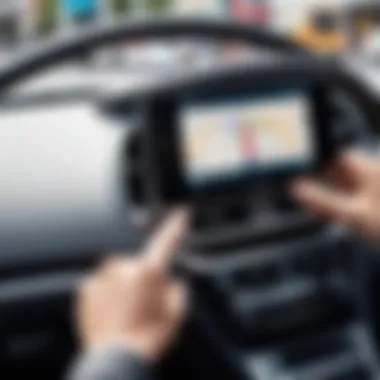Smart Ways to Locate Your Vehicle with Android


Intro
Navigating the bustling city streets can often feel like searching for a needle in a haystack when it comes to finding your parked car. With urban landscapes evolving and parking spaces becoming more limited, relying on good old-fashioned memory may no longer cut it. Thankfully, Android technology has stepped up its game, offering innovative solutions that can make the process of locating your vehicle not only easier but also more efficient.
The rise of smartphones and mobility applications has led to a plethora of tools that empower users to track their cars through a simple tap on their screens. With countless Android apps tailored for this very purpose, many individuals are now learning how to utilize these tools to save time and nerve in expansive parking lots or crowded downtown spaces.
In this deep dive, we will unpack the key features of Android technology that streamline the vehicle-locating process. We will explore various applications that stand out, dissect the technology behind them, and provide practical insights to enhance your overall experience. Whether you're a tech enthusiast or simply someone looking for a reliable way to keep tabs on your car, this guide aims to shed light on a topic that holds significant relevance in today’s fast-paced world.
Foreword to Android Vehicle Locating Solutions
In an age where our lives are deeply intertwined with technology, the need for advanced solutions to everyday problems becomes more pressing by the day. One significant challenge many urban dwellers face is keeping track of their vehicles in bustling environments. The solution lies in Android vehicle locating systems, which have revolutionized how we approach finding our parked cars. With millions of users relying on Android devices for navigation and communication, it's only natural that car locating functionalities have made their way into this ecosystem.
These Android solutions come packed with a suite of features that not only enhance convenience but also ensure safety and peace of mind. Users benefit from a network of applications designed specifically to integrate seamlessly with existing technologies. Think of it as getting a powerful assistant right in your pocket – one that can guide you back to your car with just a few taps.
Why Embrace Android Vehicle Locating Solutions?
- Ease of Use: Many Android applications have user-friendly interfaces. Users can quickly learn to utilize these features without needing a degree in computer science.
- Integration: Given that many individuals already use their Android devices for various tasks, the integration of vehicle locating capabilities feels natural. Whether it’s through smartphone apps or Bluetooth technology, everything works as a cohesive unit.
- Innovation: The rapid development of technology means that these Android applications are continually improving. New updates often bring enhanced functionalities, ensuring the tools stay relevant.
Just imagine getting to your destination, rushing off to meetings or errands, and later, while trying to retrace your steps, feeling the rising tide of panic as you search for your vehicle in a sea of cars. Android's vehicle locating solutions aim to alleviate that anxiety. They offer dedicated apps that remember where you parked, support voice assistance for quick prompts, and incorporate GPS for precise location tracking.
"Technology is nothing. What’s important is that you have a faith in people, that they’re basically good and smart, and if you give them tools, they’ll do wonderful things with them.” – Steve Jobs
Navigating the complexities of urban life can be frustrating. Still, with enhanced Android vehicle locating solutions, the journey is less daunting, allowing users to focus on what's essential rather than worry about where they left their car. As we delve into this article, we’ll explore various aspects of these solutions, their benefits, and the innovative applications that bring them to life.
Understanding the Need for Car Location Services
In today's bustling urban landscape, the rising tide of vehicles can make parking feel like searching for a needle in a haystack. As cities swell with people and cars, issues stemming from poor navigation can lead to a cascade of stress and frustration for drivers. This growing need for car location services aligns closely with the advent of Android technology, which offers a suite of tools designed to address these modern challenges.
Urban Parking Challenges
Finding a parking spot in densely populated areas often seems impossible. Picture this: you’re driving around a crowded city block, searching for a space while time slips away. Every minute you spend in this cyclical hunt eats into your schedule. Behavioral studies show that drivers can circle the same area repeatedly, wasting both time and fuel. This not only annoys the driver but also contributes to congestion, pollution, and endless roadway stress for others caught in the trap.
Consider the impacts of underground parking lots or multilayered structures. These places can be labyrinthine, and misremembering where you parked sometimes leads to a frustrating stroll through levels of vehicles. Moreover, in major events or festivals, accessing your car in a sea of vehicles can turn into a real task. Thus, convenient and efficient solutions to locate parked cars emerge as important needs in the everyday urban experience.
The Rise of Smart Technology in Vehicles
As technology morphs, so do vehicle systems. Gone are the days of simply turning a key and navigating with a paper map. With the emergence of smart technology in vehicles, a new horizon is now visible. Many drivers are upgrading to vehicles equipped with Bluetooth and GPS capabilities, automatically syncing with their Android devices.
Some new vehicles integrate state-of-the-art features that enhance drivability. For instance, thanks to vehicle tracking systems, getting back to your parked car has become a streamlined process, significantly aided by Android apps. Devices are now engineered to communicate seamlessly with smartphones, allowing users to locate their vehicle at a moment’s notice. Through this lens, one finds that having control at your fingertips is a game changer—it brings a remarkable ease to what used to be a daunting aspect of owning a car.
Incorporating connected devices like smart keys can append functionality; you can lock and unlock or even start your vehicle right from your mobile. This wave of innovation underscores the growing necessity and convenience of Android-based vehicle location solutions.
"In the fast-paced world we inhabit, every moment counts—this is where technology meets utility in the area of car location services."
As a result, understanding the implications of these advancements not only aids in convenience but also enriches the user experience. From congestion to the seamless operation of modern vehicles, the need for effective vehicle location services underscores a pivotal section of our tech-driven society.
Key Android Features Facilitating Car Location
When it comes to finding your parked car, Android technology has brought forth a suite of features that make this endeavor not only easier but significantly more efficient. As urban environments grow denser, the need for effective car location strategies has become essential. The convenience offered by these features can’t be overstated; they can save you time, prevent frustration, and even reduce anxiety associated with urban driving.
GPS Functionality
At the heart of Android's car location capabilities lies GPS functionality. This seemingly simple technology uses satellites to triangulate your position with remarkable precision. This aspect is critical when you park in sprawling lots or on city streets where your vehicle could easily slip from memory.
With built-in GPS, your Android device can mark the exact coordinates of where you left your car. As an added bonus, it often updates in real-time to keep track of your location. Consider a situation where you park in a busy shopping center. It’s easy to become disoriented among the sea of vehicles. The ability to pull out your phone and see a pinpointed location of your car can turn a potentially irritating experience into mere child's play.


Integration with Google Maps
If GPS is the backbone, then Google Maps serves as the brain of the operation. The integration of your Android device with Google Maps provides a seamless experience for car location. Not only can you find your vehicle, but also navigate back to it without hassle. Google Maps stores the location where you parked and offers step-by-step directions to guide you back.
Moreover, users often overlook the benefits of features like 'parking location sharing', which allows you to send your vehicle's location to a friend or family member. This is especially handy in scenarios where you might want someone else to pick you up or if you’re running late. Just a few taps on your screen, and you’re good to go.
"The integration of GPS and Google Maps is revolutionizing how drivers find their vehicles, especially in crowded urban landscapes."
Bluetooth Technology in Vehicle Location
While GPS and Google Maps receive a lot of attention, Bluetooth technology adds another layer of functionality worth mentioning. It offers a different way of locating vehicles through the use of Bluetooth-enabled trackers.
For instance, you might attach a small Bluetooth tracker to your keychain, making it possible to find your car with a simple app. This is particularly useful when parked in a large venue, such as stadiums or malls, where GPS signals can get drowned out among the concrete jungle.
This technology is often coupled with features that allow your phone to chirp or light up when you're near your vehicle. The moment you wander close enough, you get a subtle reminder—a handy nudge that you're almost there. This two-pronged approach, blending GPS and Bluetooth, demonstrates just how far Android technology has come in the realm of vehicle location.
Popular Android Applications for Finding Your Car
In today’s fast-paced world, the struggle of locating your vehicle can feel like searching for a needle in a haystack, especially in densely populated urban areas. Popular Android applications designed for car location not only simplify this process but also enhance the overall experience of using your vehicle. These apps provide several key benefits, including ease of use, real-time tracking, and features tailored to fit the various needs of users. The integration of Android technology in vehicle tracking helps to streamline the task of finding a parked car after a long day or a spontaneous shopping spree.
The convenience offered by these applications can’t be overstated. Instead of wandering around aimlessly in parking lots, users can merely consult their smartphone and find precise directions back to their car. Looking beyond just basic functionality, these apps often come equipped with innovative features that set them apart—Synergy with GPS, geo-fencing options, and even the capacity to share location data with friends or family enhance the app experience. Additionally, considering factors like battery life and data effectiveness becomes paramount when choosing the right tool for tracking your vehicle.
Google Maps: A Detailed Analysis
Google Maps has evolved significantly from its original navigation utility, now standing as a robust option for locating cars, particularly when it comes to parking in uncharted territories. The feature that allows users to mark their parking spot is one of the standout elements. Once parked, users can simply tap on the “Save Your Parking” button to save their car's location. It's noteworthy to mention that this is not just a place holder; Google Maps employs GPS technology for accurate tracking.
Moreover, Google Maps facilitates a user-friendly experience. With intuitive controls and a familiar interface, users can seamlessly navigate to their parking spots. Once users click on their saved location, the app generates walking directions, making the trek back to the vehicle a breeze. This level of integration speaks volumes about how deeply embedded this application has become in the daily lives of both casual and tech-savvy drivers.
"Finding your car with Google Maps is like having a reliable friend in your pocket, guiding you back when the stress of urban parking sets in."
Find My Car Pro: Features and Benefits
Find My Car Pro presents another dimension in vehicle location services, focusing on customizable features that cater to varied user preferences. One of its most compelling features is the capability to create reminders, like alerting users when they need to move their car to avoid parking violations. This proactive approach can save users from unexpected fines, a common hassle in urban settings.
Additionally, the application offers a well-designed interface allowing for easy navigation between features. Users can quickly view their vehicle’s location through integrated maps or even leverage satellite views for a clearer picture, adding more layers to situational awareness. This tool also incorporates a simple social-sharing feature, allowing users to send their car's location to friends or family, proving beneficial in crowded parking environments.
Parked Car Locator: User Experience Insights
Parked Car Locator distinguishes itself by putting user experience front and center. The app’s straightforward design and functionality make finding a car feel almost effortless. A particularly useful functionality is the ability to use its "Find Car" feature by activating sounds to help locate the vehicle more quickly. Imagine delivering peace of mind during stressful moments, when frustration can easily take the driver's seat.
From user reviews, it's clear that folks appreciate the app’s efficiency in reducing the time spent searching for their parked cars. By enabling users to set notifications based on estimated walking time, Parked Car Locator solidifies its standing as an essential tool for urban dwellers. This bit of foresight can save users from feeling lost or anxious as they navigate sprawling parking facilities or unfamiliar streets.
In summary, each of these applications provides a myriad of features set to enhance user experience in vehicle tracking. Whether one chooses Google Maps for its in-built convenience or opts for specialized apps like Find My Car Pro and Parked Car Locator, the landscape of car location technology is rich with solutions catered to diverse needs. As technology advances, these applications are poised to evolve further, cementing their positions as indispensable tools for modern motorists.
Utilizing Voice Assistants to Locate Vehicles
In today's fast-paced world, utilizing voice assistants to locate vehicles has become an invaluable aid for many drivers. With the increasing complexity of urban environments and the challenges they bring—like cramped parking spots and winding streets—having a handy tool at your disposal can save time and reduce frustration. Voice assistants, particularly on Android devices, provide a seamless way for users to engage with technology without taking their eyes off the road. These innovations go a long way in improving user convenience and accessibility, and understanding their capabilities can make a significant difference in finding your parked car quickly.
Google Assistant Capabilities
Google Assistant has emerged as a robust tool that offers a variety of features tailored for car owners. Among its standout capabilities is its ability to quickly catalog and retrieve the location of your vehicle. Once a car is parked, users can simply say, "Hey Google, where's my car?" and the Assistant will respond with detailed directions back to the vehicle's location. This can be particularly handy in larger parking facilities where finding your car can feel like searching for a needle in a haystack.
Notably, Google Assistant integrates well with GPS data and can even access parking history. This is especially useful after a long day, as it remembers where you parked and can assist you in navigating back when you’re ready to leave. Furthermore, with voice commands, users have the flexibility to choose different routes based on real-time traffic data, greatly enhancing their journey's efficiency.
"Google Assistant simplifies the otherwise complex task of finding a vehicle in bustling urban settings, especially when one’s hands are full or distractions abound."


Voice Commands and Accessibility
Voice commands take the experience a step further by providing an accessible way for users to interact with their devices while minimizing distraction. With simple phrases, drivers can communicate their needs without having to manually navigate applications. For instance, requesting locations or even sending texts can be done completely hands-free, allowing for safer driving practices.
Accessibility is another major benefit; this technology is particularly advantageous for those with visual impairments or other limitations that might hinder traditional interactions with mobile technology. The simplicity of asking a question rather than navigating through multiple screens greatly lowers the barrier to entry for many users. It ensures that anyone, regardless of their tech-savviness, can exploit this feature effectively.
Innovative Technological Integrations
When it comes to locating your vehicle using Android technology, the role of innovative integrations cannot be overstated. These technological advancements not only enhance the efficiency of car tracking but also provide a more seamless user experience. Incorporating tools like the Internet of Things (IoT) and Augmented Reality (AR) can significantly alter how users interact with their vehicles and the environment around them.
The significance here lies in how these technologies improve accuracy, convenience, and safety for users. IoT devices can gather and share real-time data about the vehicle’s location and status, ultimately leading to more robust solutions. Likewise, AR can offer visual guidance to help users navigate back to their parked cars, making the experience less of a headache and more of a snap.
As urban parking heaps its hurdles, these innovations contribute vital elements that aid frustrated drivers searching for their vehicles. The integration of such technologies can be the difference between a smooth retrieval process and a searching frenzy in crowded parking areas.
Leveraging IoT for Enhanced Car Tracking
The Internet of Things presents a plethora of opportunities for vehicle tracking. IoT-enabled devices can be attached to a vehicle, allowing owners or designated users to remotely access information about their car’s location anytime and anywhere. Each device serves as a beacon, transmitting data back to a user’s Android phone, detailing precise coordinates, engine status, and even information on whether the doors are locked or unlocked. It’s like having a digital buddy that keeps you in the loop about your car’s whereabouts.
With these IoT solutions, benefits multiply:
- Real-Time Updates: Users can get real-time updates on their vehicle's location.
- Historic Data: Access to historical data can help users remember where they parked in the past, especially in indistinct locations.
- Security Enhancements: In the unfortunate event of a theft, tracking can provide law enforcement with immediate location data, improving recovery chances.
IoT deployment does come with considerations. Users must ensure their data is protected. The moment you connect your car details to the internet, keeping privacy and data security at the forefront is essential. Regular updates from manufacturers can safeguard these IoT devices and applications, ensuring user data remains protected.
Utilizing Augmented Reality for Navigation
Augmented Reality, when mixed with navigation tools, pushes the concept of vehicle locating into a whole new dimension. Imagine pointing your phone towards a parking lot and seeing arrows or paths overlay on your screen, directing you to your vehicle. AR does this by overlaying digital information onto the real world, which helps create clear visual paths. This provides an engaging alternative to traditional maps, turning hunt into a guided experience.
Benefits of using AR for vehicle location include:
- Intuitive Navigation: The visual cues are often more intuitive than standard maps, making them ideal for quick location finding.
- Enhanced User Engagement: Users can capture AR-based experiences, turning a mundane search into a modern technology showcase.
- Clear Context: AR can provide contextual information about nearby landmarks or security features, making users feel secure and informed.
Contrarily, AR does pose its challenges. Devices must possess robust hardware capability to support AR applications. The reliance on GPS and camera quality could lead to discrepancies, particularly in dense urban environments.
Security Features in Vehicle Location Apps
As we rely more on technology to assist in locating our vehicles, ensuring the security of such solutions becomes paramount. Vehicle location apps collect and manage sensitive user data, which brings forth serious concerns regarding privacy and security. A robust security infrastructure is essential not only to protect this information but also to instill trust among users who need to feel safe in utilizing these technologies.
One major aspect of this security focus is data encryption, which has become a crucial topic in discussions surrounding vehicle location apps. With the sheer volume of personal information shared through these platforms, encryption acts as a first line of defense. When data is encrypted, even if it were to be intercepted during transmission, it remains unreadable and thus effectively useless to potential breaches. This means a hacker could capture data packets, but without the right encryption keys, they might as well be reading ancient hieroglyphs. Moreover, many reputable apps continuously update their encryption methods to stay a step ahead of potential threats, reflecting their commitment to user safety.
"In today’s digital landscape, protecting user data is not just an option; it’s a necessity."
Data Encryption and Privacy Concerns
Diving deeper into data encryption, it is vital to note that various applications implement different forms of encryption. For instance, the use of AES (Advanced Encryption Standard) is common, providing a high level of assurance that unauthorized parties cannot access or manipulate user information easily. However, even the most advanced encryption can be rendered useless if users do not practice good security habits. This includes using strong, unique passwords and being vigilant about app permissions. Users should be aware of what data they share with the app and understand how it is utilized.
Another area of concern arises from data retention policies. Some applications retain user data longer than needed, presenting an ongoing risk if these databases are compromised. Users must look for applications that employ sound policies about data retention, particularly those that offer options for users to delete their information upon request. Understanding how personal data is handled is crucial for reinforcing confidence in these technologies.
User Control over Location Sharing
Equally significant is the user’s control over location sharing features embedded in these applications. Over time, privacy controls have evolved, becoming more sophisticated yet user-friendly. A vital component is the ability for users to grant or revoke permissions based on their comfort level. More advanced applications now allow users to set preferences for when and how their location information is shared. For example, users can often choose to share their location only when using the app or can opt for a manual trigger, which activates location tracking on demand.
Moreover, applications that encourage transparency by providing clear explanations of how location sharing works and what implications it has are gaining traction. Users appreciate knowing how often GPS data is updated and to whom it is shared, whether friends, family, or third parties. This transparency acts as a bridge to foster a trust-based relationship between the user and the technology.
In summary, security features in vehicle location apps are indispensable. As users navigate the complexities of urban life, they must remain vigilant about security practices and exercise conscious choice regarding location sharing. Armed with the right tools and practices, users can enhance their vehicular navigation experiences without sacrificing their security.


User Experiences and Case Studies
Understanding how users navigate the challenges of locating their vehicles with Android technology is essential for a comprehensive grasp of the topic. This section delves into diverse real-world experiences that showcase how various tools and applications are employed, emphasizing effectiveness and user satisfaction. By studying actual case scenarios, we gain insights into the benefits these technologies can extend, as well as highlighting some potential drawbacks.
Real-life accounts bring to light the practical applications of Android locator tools. Users often document their journeys on various platforms, discussing everything from feature usability to the emotional relief of finding their cars quickly. Insightful feedback also guides developers to refine and enhance applications, leading to ongoing improvements over time.
Real-Life Applications of Android Locator Tools
Many people have stories to share, and those narratives usually highlight the sheer variety of situations where locator tools come into play. A common scenario involves urban dwellers parking in crowded shopping districts. For instance, Tanya, a tech enthusiast living in a bustling city, recently shared her struggle with finding her vehicle in a large parking structure. After turning to the Google Maps integrated feature to save her parking location, she was able to locate her car with ease after an evening of shopping.
Her experience underscores the importance of reliable GPS functionality integrated into everyday apps. The convenience offered by these applications not only alleviates frustration but also provides peace of mind. Not all users are as tech-savvy, though. Take John, for example, a retiree, who relayed that he struggled to grasp the intricacies of his smartphone's functionalities. After enlisting the help of his granddaughter, he found that simple apps like Find My Car Pro made locating his vehicle less daunting.
Another application mentioned frequently is Parked Car Locator. Users laud its simplicity. Sarah, a busy mother, recounted her experience using the app in a theme park's chaotic environment. After a long day with the kids, the app directed her seamlessly to her parking spot, allowing her to focus on her family rather than where to find the car.
Common User Challenges and Solutions
Not every user experience is smooth sailing, however. While technologies are meant to simplify lives, users frequently encounter hurdles along the way. Connectivity issues often arise, especially in densely populated areas where signal strength can be poor, leaving users frustrated when their locator apps falter.
Furthermore, battery drain remains a major concern. Many apps require continuous GPS usage, which can quickly sap your device's power. For instance, Mike, a frequent business traveler, found himself juggling battery packs to keep his phone alive on a long trip. As a solution, he started to utilize Android's battery saver mode and enabled location services selectively, which helped extend his device's life.
Despite these challenges, the community provides abundant support through various forums. Engaging in discussions on platforms like Reddit, users share insights and troubleshooting tips that foster cooperation and innovation.
Ultimately, understanding the user experience paints a vivid picture of how Android technology can improve vehicle locating capabilities while also addressing common barriers. Each story shared adds to the collective knowledge base, revealing the evolving landscape of vehicle locator solutions.
Future Directions in Android Car Locator Technology
As we stand on the brink of what seems to be a technological renaissance, the future of Android car locator technology looks brighter than ever. This section dives into what’s coming next in terms of advancements and integrations that can radically improve how we locate our vehicles. In urban settings where parking woes plague even the savviest of drivers, these innovations promise to enhance not just convenience, but also the efficiency of urban mobility. With the rapid progression in mobile technology and data management, there’s a pressing need to grasp how future developments can profoundly affect our vehicle finding experiences.
Predicted Technological Advancements
The landscape of automotive tech is evolving, and several advancements are on the horizon that are worth keeping an eye on. First and foremost, we can expect a deepening integration of 5G technology into car locator apps. With lightning-fast data transfer speeds, the ability to pinpoint a vehicle’s location down to milliseconds could become the norm rather than an exception. The higher bandwidth could allow for real-time location tracking and updates, enabling users to constantly monitor where their car is parked without delays.
Moreover, advancements in augmented reality will take vehicle locating to a whole new level. Imagine walking through a parking structure with your phone augmented to display directional arrows guiding you toward your car. Users might see their parked vehicle superimposed over the live camera feed. This added layer of functionality not only enhances user experience but also reduces the cognitive load involved when trying to remember where one parked.
"Future car locator technologies are expected not only to be smarter but also more intuitive, making the act of finding a vehicle almost second nature."
Another groundbreaking advancement we can foresee is the potential for biometric security measures to interface with vehicle location systems. This could mean that only specific users—say, those with registered fingerprints or facial recognition—could gain access to the vehicle's location data. The blend of security and convenience would alleviate worries about lost or stolen vehicles.
The Role of Artificial Intelligence in Navigation
As we look ahead, the integration of artificial intelligence into car locator technology is particularly exciting. AI has already made strides in predictive analytics, and its potential in navigation systems cannot be overstated. By learning from individual user behavior patterns, AI can significantly enhance how vehicle location services operate.
With AI, car locator apps could not only assist users in finding their vehicles but also provide tailored recommendations based on the time of day, typical parking spots, and historical data. For example, if a user tends to park on a street every Friday evening, the app could automatically notify that user of the location and even alert them to traffic conditions as they prepare to head to their car.
Additionally, integrating AI can enhance the routing algorithms used by locator apps. Instead of simply directing users to their vehicle, AI can consider real-time factors such as traffic patterns and hazards, potentially suggesting alternate routes to make the journey quicker and more efficient. Furthermore, as machine learning algorithms improve, the accuracy of features like smart alerts for when your car is moved or recognized as being in a ‘no-parking’ zone will improve.
In summary, the future of Android car locating technology promises not just to adapt but to completely redefine how we interact with our vehicles. As these innovations emerge, they are bound to create a blend of efficiency, safety, and convenience that will make finding your parked car a seamless experience. Keeping abreast of these developments will allow users to leverage the best tools available, thereby turning the often-dreaded task of vehicle locating into a trivial undertaking.
End: The Evolution of Car Locating through Android
In today's fast-paced world, the ability to easily locate one's vehicle is not just a luxury but a necessity. The advent of Android technology has reshaped how we approach this seemingly mundane task. No longer do we rely on our memory alone to navigate vast parking lots or congested city streets; instead, we leverage an array of sophisticated tools at our fingertips. The evolution of car locating via Android has brought about substantial benefits that go beyond convenience.
One crucial aspect of these innovations is the integration of smart technology within vehicles. As cars become increasingly equipped with sensors and GPS systems, Android applications now harness this data to provide more precise locations and insights. Take, for example, Google Maps, which is continuously updated with traffic conditions, allowing users to not only find their cars but also plan their routes effectively.
Moreover, Bluetooth connectivity has emerged as a game-changer. This functionality extends the communication between your smartphone and the car, ensuring already-established connections aid in pinpointing a vehicle's location with remarkable accuracy. This is particularly handy when parking in extensive urban areas where landmarks may be sparse.
"Each advancement in technology enhances the dialogue between man and machine, making life not just easier but also more intuitive."
The benefits of these innovations are not merely confined to tech-savvy individuals. Casual users can effortlessly experience the magic of these apps, which often come with user-friendly interfaces. Even those who are not particularly inclined towards technology find it straightforward to utilize these applications, thanks to clear navigational prompts and voice-command features that make locating a vehicle as simple as saying, "Find my car."
However, as we regard this evolution, it's essential to remain cognizant of privacy and security implications. With data encryption now merely a checkbox in many applications, users must actively engage with their settings to ensure their data remains safe. This consideration is a natural byproduct of our reliance on technology; without it, we risk exposing vital information.
Looking to the future, we can anticipate further advancements, such as the role of artificial intelligence in refining these applications. Predictive analytics could soon be commonplace, forecasting potential parking spaces based on user history and real-time data. The landscape of vehicle finding technology is ever-changing, and it is imperative for both users and developers to stay abreast of these trends.



